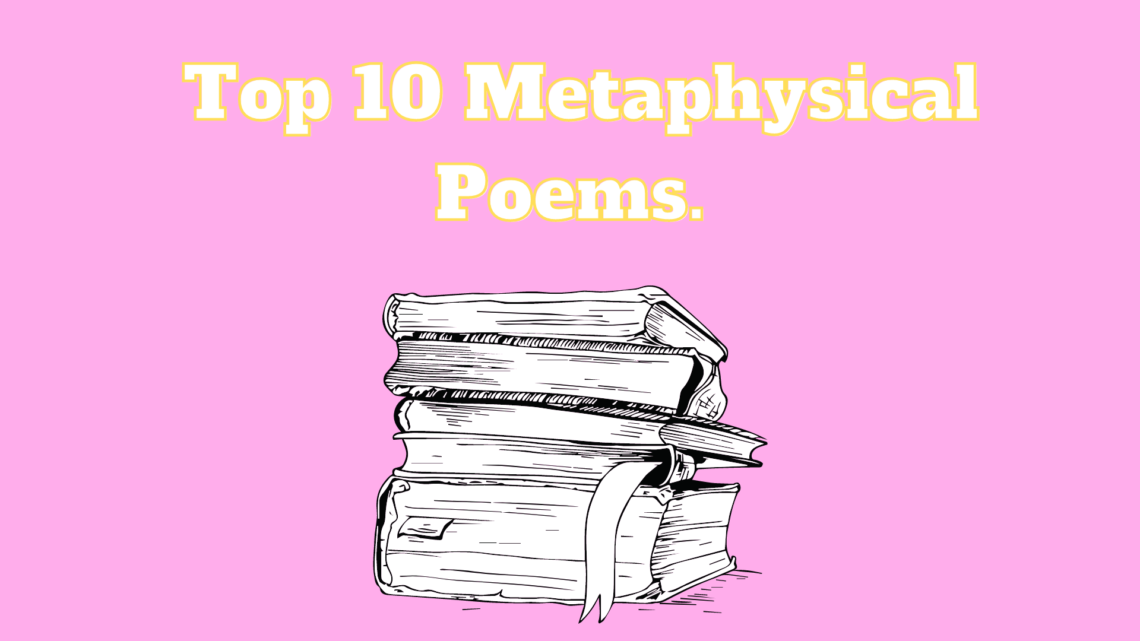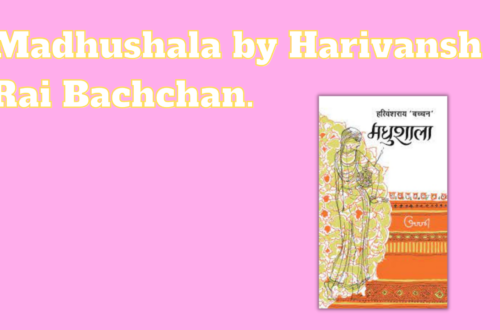
Top 10 Metaphysical Poems.
One essential trait of a human from the earliest age was to find a way to express themselves. As humans have evolved over the centuries, how they express themselves has changed. One of the popular ways to express themselves is through writing poetry. As every individual has their way or a unique style of expressing themselves, poems also have different styles. Today we are going to talk about metaphysical poetry.
Metaphysical poetry is related to metaphysics. Metaphysics is the branch of philosophy that studies the nature of reality. Metaphysics can be understood as something beyond physics. The abstract part of philosophy attempts to answer two questions, “what is there ?” and “what it’s like?”. So when these questions are expressed in the form of poetry, they become metaphysical poetry. In nature, metaphysical poems are highly intellectualized and use a highly complicated thought. In his book ” Lives of the most eminent English poets, the term metaphysics was coined by Samuel johnson, a poet and literal critic, in his book ” Lives of the most eminent English poets.” He wrote about a group of 17th-century poets who had the same characteristics as the wit and elaborative style they used. Metaphysical poetry usually had a religious sentiment relating to it as it pounds tough questions about the existence of God with a wit. That’s why their speech contained paradoxes and puns. John Donne, an English poet, was the one who was the leader and the founder of the metaphysical school of poetry. Other writers that contributed to this type of poetry were Abraham Crowly, Henry Vaughan, etc.
so today, we are going to see the top 10 metaphysical poems of all time written by these fantastic poets
1. THE FLEA by John Donne
The famous poem of John Donne beautifully expresses the erotic expectations of the poet from his loved one through a creature as little as a flea. It makes us think about how the simple act of the flea-sucking blood of two lovers can be related to both of them having intercourse.
In the poem, he uses the argument by making the flea his example of winning her love over. He convinces her to not kill it because it would be a sin, and the blood relation they had inside the flea was purest. It was a symbol of togetherness and marriage temple.
Still, the lady kills the flea, but the poet doesn’t give up and tries to use it to his advantage. He tries to make her feel that she might have won the fight, but as a flea losing its life has no consequences, losing her virginity will also have none.
2. THE COLLAR by George Helbert
the poem portrays the conflict of a ma doubting his religious beliefs inside his mind. The poem starts with him wanting to give up on his present life as the religious collar he wears seems like a dog collar to him with non-rewards but only slavery. At this time, he tends to make changes in his life and wants to get the time passed and desires to live it differently. He wants to forget the difference between right and wrong and just focus on self-pleasure this time. We see the hights of his thoughts that he has been imprisoned as we read the poem and how he thinks no rope and fear will control him from now and how he has a will to be a more muscular man. In the end, the speaker answers to his God as the one who penetrates his anxiety and fears and calms him down. Therefore, the poet’s decision is changed, and he takes back the path he was going on.
3. THE SUN RISING by John Donne
this is one of the best and most famous poems of John Donne. In this poem, the poet is having a confrontation and challenging the sun and its powers. While he is lying in bed with his lover, the poet gets angry at the sun as it rises and disturbs him through its rays coming from the curtains. The poet warns the sun that it shouldn’t think that he has the power to regulate the time that two lovers spend.
The poet then disregards the sun’s powers as he claims he can simply ignore him by closing his eyelids. Still, he won’t do that as he doesn’t want to lose sight of her lover for even a second.
The very next moment compares his bed to the world. It makes the beloved a representation of all kings and queens, so now he has the permission to warm their bedroom, and then the whole world will be heated.
4. TO COY HIS MISTRESS by Andrew Marvell
this poem is aesthetically written by the poet based on the poet wooing her mistress to make love with him. In this beautiful poem, the poet writes his efforts as the named”coy mistress ” rejects to sleep with him. But the reason for the rejection is kept hidden in the poem. The poet’s response to this is exceptionally captured in the poem. He says if he had enough time, he would spend eternity admiring her and waiting for her. But the fact is that human life is short, and he doesn’t have enough time as, after death, no pleasure or pain can be felt. but by loving each other, they can spend the short time they have left beautifully and make something themselves
5. THE PULLEY by George Herbert
this poem represents one part of the story in which God chose to imbue humanity with blessings. The poet starts the poem by narrating the story of creation and how God provided humans with intellect, strength, beauty, and wisdom. And he states that these features are essential for humans that flow from God to humankind. But the poet started by saying that there is one blessing that God didn’t let flow. He adds more that there’s a reason God didn’t give it to us so that he can keep us close to him. When a person loses hope, he can turn to God and ask for help. The one thing that the poet talking about here is the trait of humans loving nature more than him.
6. THE RETREAT by Henry Vaughan
retreat depicts the desire of the speaker to get out of his past where he was a noble and happy, decent human being. At the beginning of the poem, the poet mourns his lost days when he was a kid. When he was not adulterated by the wrongs of this world. It would be when he had not yet ventured far from his home or realized the integral war that would consume him. Today he is concerned about his own nature and emotions as he was not even considered when he was young. In the end, the speaker speaks about the unchanged faith that he will be dead and it will be the ending of his previous life.
7. THE DEFINITION OF LOVE by Andrew Marvell
This poem does describe what love is between the poet ad his lover in the words of Andrew Marvell. Andrew states that love is perfect yet unattainable. In the poem, he first addresses the readers with the amount of love he has. The love poet described was rare as it came after their marriage. In this kind of love, hope is barely minimum as this kind of love is difficult to achieve. The next part of the poem tells the sorrow dividing the lovers because of fate. They are far away from the two opposite poles. They can be united once again if the world has collapsed or in any violent way.
8. TO THE VIRGINS, TO MAKE MUCH OF TIME by Robert Herrick
This poem informs us of the changes women undergo with time in their beauty and value. The poet starts by stating that the woman should take advantage of her beauty and get as much love as others. When she possesses her beauty and before time takes over. Once time has passed, all her happiness will be gone, so there is no time to waste being coy. They should marry as soon as possible as they can end up alone.
9. THE GOOD MORROW by John Donne
A sonnet that describes the situation of perfect love in which the speaker and her lover communicate. John says before meeting his lover, their lives were like children. He knows that no pleasure can out rule what love has given them. Next, he conveys that his love can not fail as it controls him completely, and he sees no other world outside their room. In the end, the poet says that the perfect love is like any human body. It has to be best for both physical and emotional feelings.
10. DEAD BE NOT PROUD by John Donne
this poem is one of the best poems that the poet has written on death, as it says to not fear death as it’s morally corrupt and a gateway to heaven. In this poem, the speaker confronts death as a personified antagonist. This is an enemy that many people fear, but the speaker in this sonnet basically tells him off. The speaker’s tone indicates that he is not terrified of death and does not believe death should be so confident and self-assured. The secure style of ‘Death, be not Proud,’ as well as death’s direct confrontation, convey an ironic sense of comfort to the readers by implying that death is not to be frightened at all but that death will be defeated by something much more significant in the end.




